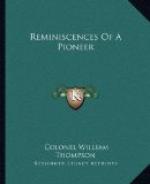After the surrender, John and son, a lad of 16, were placed on board a steamer and started to a reservation up the coast. When off the mouth of Rogue river and beholding the hunting grounds of his people and the familiar scenes of his youth, he made a desperate attempt to capture the ship. It was a “Call of the Wild,” and snatching a sabre from his guard he succeeded in driving them below and for a time had possession of the ship’s deck. But firearms were brought into play, one leg of the boy was shot off and John, badly wounded, was placed in irons. He told his captors that it was his purpose to capture the ship, run her ashore and escape into the mountains. On a reservation, John spent the remainder of his days,—a captive yet unconquered save by death. As previously stated, in point of courage, cunning, savage ferocity and soldierly ability and generalship, Tyee John has had few equals and no superiors on the North American continent.
It was not my purpose to attempt a detailed history of the Rogue River war as that task were better left to the historian with leisure to delve into the musty records of the past, but I sincerely hope that when the true story of that bloody time is written the kernel of truth will be sifted from the mass of chaff by which it has thus far been obscured. My purpose is merely to give the facts in a general way as I received them, and the conditions surrounding the pioneers of which I was one. The true story of the Rogue River war is but a duplicate of many other Indian wars. It is a story of incompetent, bigoted, self-opinionated, Indian agents, wedded to form and red tape, without any of common sense or “horse sense,” required in dealing with conditions such as existed prior to the breaking out of he war.
The early immigrants to the Oregon, and indeed, to the Pacific coast, merely sought to better their conditions. They came with their flocks and herds, their wives and their children, their school books and their Bibles, seeking not to dispossess or rob the occupants of the land. They found a vast empire, of which the natives were utilizing but a small portion. There was room for all and to spare. The natives at first received the white strangers with kindness and hospitality. There were exceptions even to this rule, but it was the exception. The white man’s property soon excited the cupidity of the Indian, and knowing no law but the law of might, he sought to possess himself of the same. And right here I want to say, that from an experience covering more than half a century, the only thing an Indian respects on earth, is Power. Courage he respects for the simple reason that courage is power. And I might further add, that this rule applies with equal force to the white as well as to the copper-colored savage.




